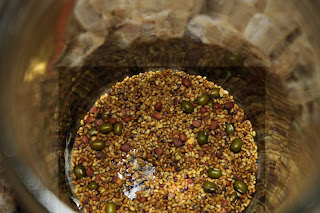Who knew there was so much to learn about making bread? I surely didn't but isn't that the way with just about everything? The more you learn about a subject, the more you realize you don't know very much at all. That's what has happened with bread making. I first studied about the development of gluten and the role of salt, flour, oil, water, and eggs in bread making.
I thought I knew quite a bit, since after all I've been making bread since I was a kid but my white breads rose to a whole new level of flavor and textures using basically the same ingredients. I could make light and airy, chewy, or dense. But white bread leaves me feeling guilty. I know there aren't many nutrients in it and the carbs send your glycemic levels skyrocketing. So then I studied different grains and the changes you should make with each due to their unique characteristics.
I like wheat bread but there just seems to be something missing in comparison to the levels my white bread had reached.
Then there was the nagging reminder that I'd promised my doctore that I'd start to eat Ezekial bread. Like that's available in the middle of nowhere, so I went searching on the Internet for a recipe. Most just didn't seem like much more than a knock off to the truth. Later I found out this was the case. Yes, they added bean flour and other good things but they had still missed the point. Ezekial bread according to what I understand from my doctor was suppose to have as a base sprout flour.
The recipes shortcuted this step which skips the huge nutrient boost which is the whole point of making the bread in the first place.
The bread starts with the sprouting of grain or grains. Though I guess you can incorporate the sprouts mashed, I kind of liked the idea of drying the sprouts and then grinding them into a flour. This of course means I have to sprout, dehydrate, and then grind. Why go to all this bother? The numbers sold me, 28% more Thamine (B1); 315% more riboflavin (B2); 66% more niacin (B3); 65% more pantothenic acid (B5); 111% more biotin, 278% more folic acid; 33% more vitamin C. Wow!!, and another site had the numbers even higher along with percentages for other nutrients also. Sprouting other grains does the same thing, the nutrient base increases dramatically.
Why, sprouting your grains activates food enzymes and neutralizes antinutrient enzymes like phytic acid which binds minerals, preventing your bodies ability to fully absorb nutrients. In other words, you may be eating nutrient rich whole grains but your body isn't getting much out of them.
I haven't checked but I'd bet that doesn't hold true for the calories too. Nope, I'm sure I'm absorbing every single one of those. LOL
And not only are you getting far more nutrients and your body is able to absorb them more fully, but there are fewer starches and a lower glycemic level also. More protein is released also. Does this mean the gluten develops more easily? Do I need to knead the bread as long as you traditionally do with whole grain bread? Does the yeast amount per cup change? I haven't a clue.There are still plenty of questions to be answered. Yet, when all this is answered and a tasty loaf is worked out, I'll know that I'm getting the most out of my calories and I won't feel so guilty eating bread.
Yes, it is true, baking will diminish the nutrient levels some since heat will kill off some of them but since the bread will be starting out at a much higher level, you are still getting far more than with a simple whole wheat flour loaf. Besides, what you get your body can absorb.
So here I go... Step one in this experiment is sprouting the wheat which is reported to take two to three days. I'm do mine in a canning jar. A loose woven cheese cloth for the top allows the water to pass in and out easily but not the grain. Don't use your more expensive cheese making cloth. Go buy some of the cheap kind at the hardwear store or grocery store. Cut a piece larger than the top circumference of your jar.Then screw on the jars lid without the solid center. Pour water into the jar covering your wheat by a couple inches. I poured water in and out to rinse my wheat before covering the grains to soak over night or 12 hours. Tomorrow, I will drain the water off the grain and rinse the wheat three times, morning, noon, and night. Four times is even better.
Since I was sprouting, I started another jar of a variety of sprouts suitable for salads and sandwiches. They've been sitting in my refrigertor for quite some time. I hope they are still good. They should be since they were kept cold. I've sprouted these kind of seeds many times in the past. That means sprouting grains shouldn't be any big deal. Yup, another adventure has begun so stay tuned and watch how it turns out.



No comments:
Post a Comment